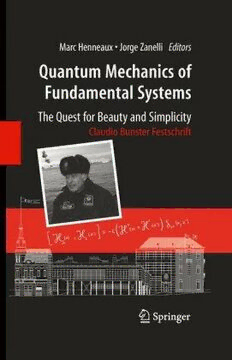
Quantum mechanics of fundamental systems: the quest for beauty and simplicity: Claudio Bunster festschrift PDF
297 Pages·2009·3.485 MB·English
Most books are stored in the elastic cloud where traffic is expensive. For this reason, we have a limit on daily download.
Preview Quantum mechanics of fundamental systems: the quest for beauty and simplicity: Claudio Bunster festschrift
Description:
In life and work, Claudio Bunster (formerly Teitelboim) prefers extreme challenges. Bunster, a physicist who contemplates brain-warping theories of space and time, returned to his native Chile from the United States precisely when most intellectuals would have stayed clear— during the middle of the Pinochet dictatorship (K. Mossman, Proceedings of the National Academy of Sciences)Against this backdrop, Bunster founded the Centro de Estudios Científicos (CECS), a world class institute for frontier science research in Chile. His mentor, John A. Wheeler often used Teddy Roosevelt’s advice, "Do what you can, where you are, with what you have." "I followed his advice," said Bunster. "At latitude 40°S there is a science institute where one can find the footprints of Wheeler in every corner."As a true pioneer, Bunster was ahead of his time, opening roads, pushing the frontiers, under extreme conditions, in unexplored environments. Throughout his career, black holes, monopoles, the Antarctic vastness and the entire universe, have been the objects of his fascination: extreme, simple objects where beauty is best captured and displayed.On 10 and 11 January 2008, the meeting Quantum Mechanics of Fundamental Systems: The Quest for Beauty and Simplicity –Claudio’s Fest took place in Valdivia to celebrate Claudio Bunster’s 60th birthday. This volume collects the contributions that were discussed at this meeting by many of Bunster’s colleagues and longtime collaborators. Articles by L. Brink, S. Carlip, F. Englert, S. Hawking, M. Henneaux, C.W. Misner and L. Susskind, among others, highlight the broad impact of Bunster, providing unique insightful views on many topics addressed by him in his scientific career, ranging from black holes and symmetries in gravity and supergravity, to cosmology.The meeting was co-organized by the CECS and the International Solvay Institutes.
See more
The list of books you might like
Most books are stored in the elastic cloud where traffic is expensive. For this reason, we have a limit on daily download.
